Melody
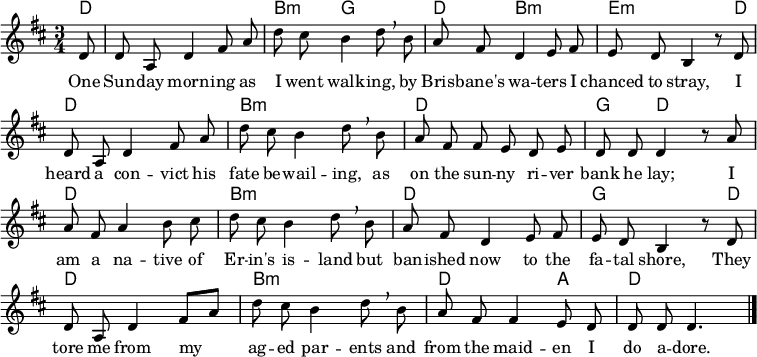
"Moreton Bay" is an Australian folk ballad. It tells of the hardship a convict experienced at penal settlements around Australia, in particular, the penal colony at Moreton Bay, Queensland, which was established to house convicts who had reoffended in settlements in New South Wales. The song references exceptionally brutal treatment of convicts while the colony was under the command of the infamous Patrick Logan. It also describes Logan's death at the hands of local Aborigines and the joy felt by the convicts upon hearing the news. The song may have been composed at the time of Logan's death on or soon after 18 October 1830. [1] A version entitled "The Convict's Arrival" or "The Convict's Lament on the Death of Captain Logan" has been attributed to Francis MacNamara [2] who was transported to Australia in 1832 and was never held at Moreton Bay. It is customarily sung to the tune of the early 19th century Irish ballad "Youghal Harbour" (also known as "Eochaill"), [3] which was used later for the song "Boolavogue", the lyrics of which were written in 1897 for the centenary of the Irish Rebellion of 1798. [4]
Some lines of "Moreton Bay" were used by bushranger Ned Kelly in his Jerilderie Letter in 1879. The tune was adopted as Clancy's theme in the 1982 film The Man from Snowy River . It also featured in the 2003 film Ned Kelly . In the "Asparagus" episode of the Australian children's TV show, Bluey , the character Lucky's father, Pat, is heard singing the first line of the song. [5]
(Version as published by Robert Hughes in 1986) [6]
One Sunday morning as I went walking, by the Brisbane's waters I chanced to stray,
I heard a convict his fate bewailing, as on the sunny river bank he lay;
I am a native of Erin's island but banished now to the fatal shore,
They tore me from my aged parents and from the maiden I do adore.
I've been a prisoner at Port Macquarie, Norfolk Island and Emu Plains,
At Castle Hill and cursed Toongabbie, at all those settlements I've worked in chains;
But of all those places of condemnation, in each penal station of New South Wales,
To Moreton Bay I've found no equal: excessive tyranny there each day prevails.
For three long years I was beastly treated, heavy irons on my legs I wore,
My back from flogging it was lacerated, and often painted with crimson gore,
And many a lad from downright starvation lies mouldering humbly beneath the clay,
Where Captain Logan he had us mangled on his triangles at Moreton Bay.
Like the Egyptians and ancient Hebrews, we were oppressed under Logan's yoke,
Till a native black who lay in ambush did give our tyrant his mortal stroke.
Fellow prisoners, be exhilarated, that all such monsters such a death may find!
And when from bondage we are liberated, our former sufferings shall fade from mind.

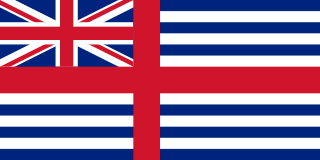
Van Diemen's Land was the colonial name of the island of Tasmania used by the British during the European exploration and colonisation of Australia in the 19th century. A British settlement was established in Van Diemen's Land in 1803 before it became a separate colony in 1825. Its penal colonies became notorious destinations for the transportation of convicts due to the harsh environment, isolation and reputation for being inescapable. Macquarie Harbour and Port Arthur are among the most well-known penal settlements on the island.

Bushrangers were originally escaped convicts in the early years of the British settlement of Australia who used the bush as a refuge to hide from the authorities. By the 1820s, the term had evolved to refer to those who took up "robbery under arms" as a way of life, using the bush as their base.

Penal transportation was the relocation of convicted criminals, or other persons regarded as undesirable, to a distant place, often a colony, for a specified term; later, specifically established penal colonies became their destination. While the prisoners may have been released once the sentences were served, they generally did not have the resources to return home.
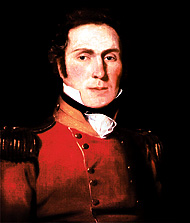
Captain Patrick Logan was the commandant of the Moreton Bay Penal Settlement from 1826 until his death in 1830 at the hands of Aboriginal Australians. As he had been hated by convicts, there were rumours that escaped convicts living in the bush had attacked him, but there is no evidence of this.

The Macquarie Harbour Penal Station, a former British colonial penal settlement, established on Sarah Island, Macquarie Harbour, in the former colony of Van Diemen's Land, now Tasmania, operated between 1822 and 1833. The settlement housed male convicts, with a small number of women housed on a nearby island. During its 11 years of operation, the penal colony achieved a reputation as one of the harshest penal settlements in the Australian colonies. The former penal station is located on the eight-hectare (twenty-acre) Sarah Island that now operates as a historic site under the direction of the Tasmania Parks and Wildlife Service.

Botany Bay is an open oceanic embayment, located in Sydney, New South Wales, Australia, 13 km (8 mi) south of the Sydney central business district. Its source is the confluence of the Georges River at Taren Point and San Souci as well as the Cooks River at Kyeemagh, which flows 10 km (6 mi) to the east before meeting its mouth at the Tasman Sea, midpoint between the suburbs of La Perouse and Kurnell. The northern headland of the entrance to the bay from the Tasman Sea is Cape Banks and, on the southern side, the outer headland is Cape Solander and the inner headland is Sutherland Point.

Foster Fyans was an Irish military officer, penal colony administrator and public servant. He was acting commandant of the second convict settlement at Norfolk Island, the commandant of the Moreton Bay penal settlement at Brisbane, the first police magistrate at Geelong, and commissioner of crown lands for the Portland Bay pastoral district in the Port Phillip District of New South Wales. He is the great-great-grandfather of actor Sam Neill.
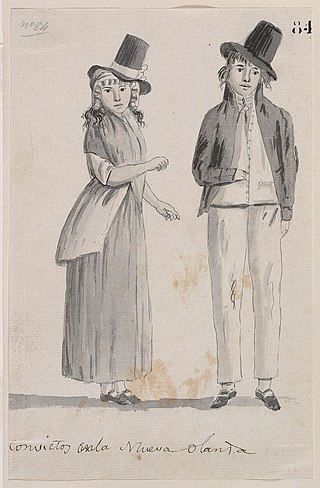
Between 1788 and 1868 the British penal system transported about 162,000 convicts from Great Britain and Ireland to various penal colonies in Australia.

William Sorell was a soldier and third Lieutenant-Governor of Van Diemen's Land.
"Boolavogue" is an Irish ballad commemorating the campaign of Father John Murphy and his army in County Wexford during the Irish Rebellion of 1798. It was composed by Patrick Joseph McCall in 1898, the centenary of the Rebellion.
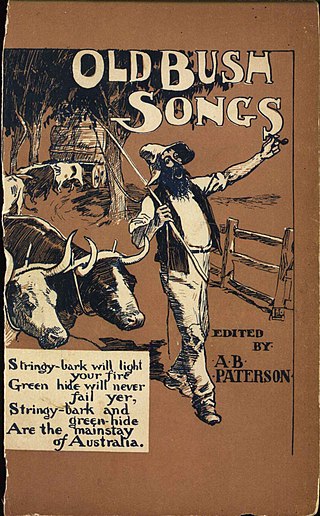
The bush ballad, bush song, or bush poem is a style of poetry and folk music that depicts the life, character and scenery of the Australian bush. The typical bush ballad employs a straightforward rhyme structure to narrate a story, often one of action and adventure, and uses language that is colourful, colloquial, and idiomatically Australian. Bush ballads range in tone from humorous to melancholic, and many explore themes of Australian folklore, including bushranging, droving, droughts, floods, life on the frontier, and relations between Indigenous and non-Indigenous Australians.

Australian folk music is the traditional music from the large variety of immigrant cultures and those of the original Australian inhabitants.
Francis MacNamara, known as Frank the Poet, was an Irish writer, a convict, transported to the Colony of New South Wales, Australia from Cashel, County Tipperary, Ireland, he composed improvised verse expressing the convict's point of view.

George Edwards was a Lieutenant with the 57th Regiment, assigned to the Brisbane Convict settlement in the 1830s. Edwards was born in Hastings, Sussex, England, on 2 February 1795. He joined the British Army, at the age of 24, as an Ensign. In January 1827, Edwards sailed on the convict ship Asia, from Deptford to Sydney, commanding a detachment of 1 sergeant, I corporal and 16 soldiers as guards of the convicts. In October of the same year, Edwards was promoted to Lieutenant, before the ship docked in Sydney in March 1828.

Way Out Yonder is an album by Andy Irvine, recorded between July and December 1999 and released in January 2000. It was co-produced by Irvine and Steve Cooney.

The Moreton Bay Penal Settlement operated from 1825 to 1842. It became the city of Brisbane, Queensland, Australia.

The First Brisbane Burial Ground is a heritage-listed archaeological site at Skew Street, Brisbane City, City of Brisbane, Queensland, Australia. It is also known as Skew Street Cemetery. It was established in 1825 as part of the Moreton Bay penal settlement. It was added to the Queensland Heritage Register on 16 July 2010.

The Quandamooka people are Aboriginal Australians who live around Moreton Bay in Southeastern Queensland. They are composed of three distinct tribes, the Nunukul, the Goenpul and the Ngugi, and they live primarily on Moreton and North Stradbroke Islands, that form the eastern side of the bay. Many were pushed out of their lands when the English colonial government established a penal colony near there in 1824. Each group has its own language. A number of local food sources are utilised by the tribes.
The Frederick escape was an 1834 incident in which the brig Frederick was hijacked by ten Australian convicts and used to abscond to Chile, where they lived freely for two years. Four of the convicts were later recaptured and returned to Australia, where they escaped the death sentence for piracy through a legal technicality.
Hannah Rigby was an Australian convict who was notable for serving three separate sentences of transportation. By remaining in Brisbane when the penal settlement closed in 1839, she became one of the first permanent settlers in what is now Queensland.